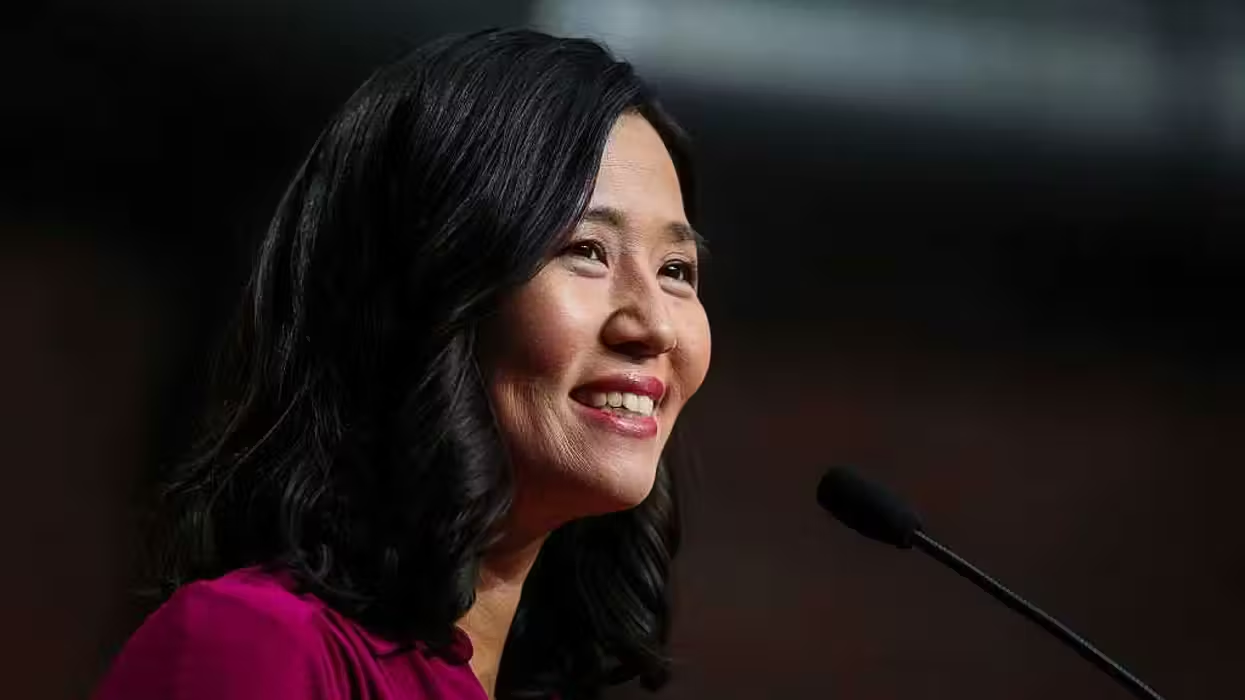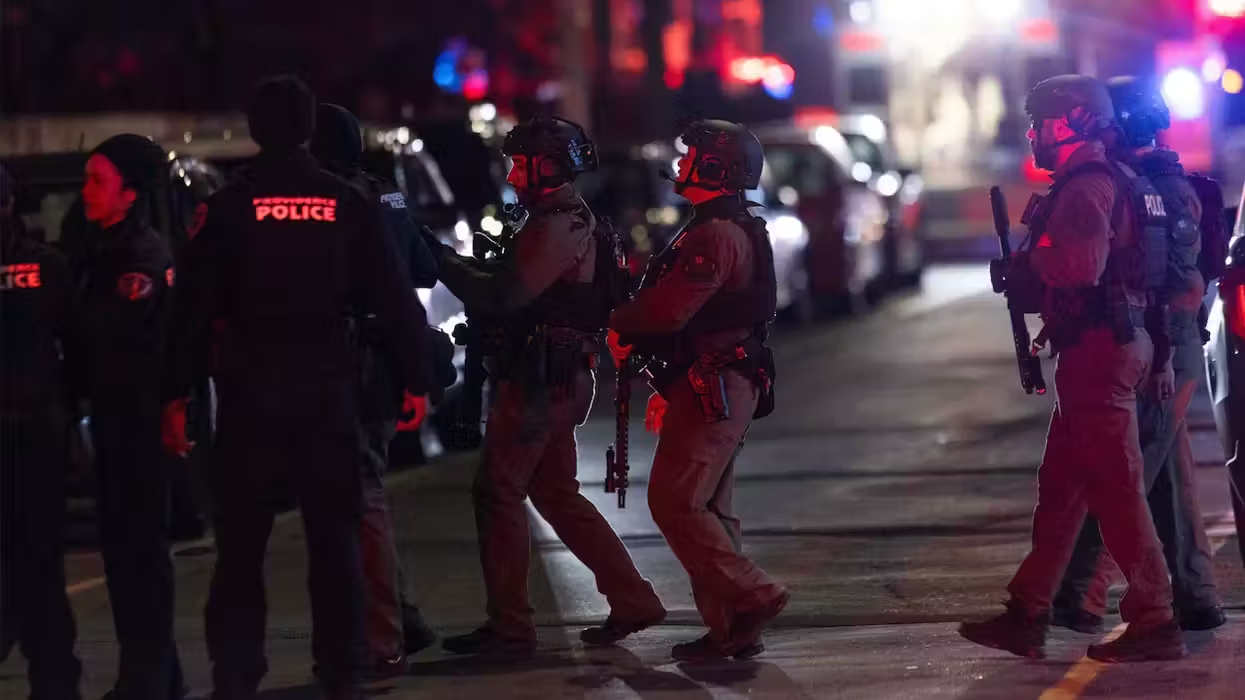
© 2025 Blaze Media LLC. All rights reserved.
The Tokyo Rose chronicles part I: How an ambitious young Chicago journalist discovered the truth about the patriot destroyed by our government
January 21, 2014
In chapter 9 of Miracles and Massacres, Glenn Beck’s latest book, we learn the story of Iva Toguri, aka Tokyo Rose, an American citizen whose life was ruined during World War II after she was prosecuted as a traitor in a political decision made by the U.S. government. One aspect of the story that was left out of the book was how Toguri’s pardoning in 1977 – the last act of President Gerald Ford’s administration, almost three decades after initially being charged as a traitor – came to pass.
In a Blaze Books exclusive, we spoke with Ronald Yates, a former Chicago Tribune journalist, who was responsible for publishing the exposés in 1976 that ultimately helped Iva Toguri gain her pardon, and one of only a handful of people who became a close personal acquaintance with Toguri in her later years. This is our first story in a series based on our interview with him.
Ronald Yates, a Kansas City born former Chicago Tribune journalist, former Dean Emeritus of the College of Media at the University of Illinois and current author could not be more different than Iva Toguri, the Japanese-American whose life was turned completely upside down in the aftermath of World War II. Yet through a circuitous and fortuitous path, their two lives would become inextricably intertwined.
Yates joined the Chicago Tribune straight out of college in 1969-1970 where he worked as a general assignment reporter, getting his feet wet in various aspects of the newspaper business. By chance, in response to one of his early columns titled “Action Express,” Yates received a letter that would forever change his life. The letter stated: “I understand that the infamous Tokyo Rose lives in Chicago.”
 Iva Toguri performing during a broadcast on 20 September, 1945. (Image Source: Youtube screengrab)
Iva Toguri performing during a broadcast on 20 September, 1945. (Image Source: Youtube screengrab)
The young journalist was struck by the message. Yates says “...like most people of my generation I grew up listening to and watching these old WWII movies in the ‘50s and ‘60s and she was always in these movies…somebody named Tokyo Rose was broadcasting to American troops, so I thought well this is an interesting idea, let me go talk to her.”
When Yates tracked Iva Toguri down to Toguri’s father’s store on the North Side of Chicago, his efforts to see her were in vain. He received the following message: “No, she won’t talk to the press.”
[sharequote align="center"]I made a file for myself and said ‘Well someday I’ll come back and look at this again.’[/sharequote]
But Ronald Yates was not going to let the story die.
Yates, the then up-and-coming reporter says:
“...my curiosity was peaked at that time so I went back to the [Chicago] Tribune and I dug through all the clips we had in the ‘morgue’ and in those days nothing was online, there was no e-file, nothing like that…it was going through all of these envelopes of clips that were written in the ‘40s and the early ‘50s. So I pulled all these clips out and read through them and read through them and read through them again and I felt ‘Geez, this was kind of a fragile’…the evidence seemed very fragile to me. And I made a file for myself and said ‘Well someday I’ll come back and look at this again.’”
Several years later that time would come.
By 1974, Yates had moved from Chicago to Tokyo as a foreign correspondent. During his time in Tokyo he struck up a friendship with a man named Ken Ishii. Yates and Ishii became golf buddies, and it was during one of their days out on the links that Tokyo Rose’s name would re-appear. As Yates tells it:
“I was talking to him one day about what it was like to be living in Tokyo during the war which he had done. And he said ‘Oh it was really terrible…’ And I said I thought about doing a story about what it was like living here and I had mentioned the fact that Iva Toguri was living in Chicago and he says ‘Well I worked with Iva.’ I said ‘What?’ He said, ‘I worked with her on the radio.’”
[sharequote align="center"]Ronald Yates had uncovered a grave injustice[/sharequote]
At this point, Yates recounted to Ishii his story of digging through all the available evidence surrounding Toguri’s conviction, and his belief that on the merits she was innocent of any wrongdoing. Ishii agreed. Yates asked Ishii why he too came to that conclusion. Ishii’s response was cryptic: “Well it’s a long story and there are some people involved in it that may not even want to talk about it.”
Yates knew he was on to something. Ishii’s comments,
“…set off all sorts of alarm bells in my mind and I wanted to find out more about it so I began checking and finally, Ken reached these two guys [George] Mitsushio and [Kenkichi] Oki and I convinced them to talk to me over a couple of times. They didn’t want to say very much and finally the second or third time I talked with them they looked across the table at me and told me what they had done, that they had lied at her trial. And that just really shocked me and that set off another set of alarm bells and I decided to investigate it further, and I did…I talked to everybody she worked with even including the Japanese colonel involved with “Zero Hour” and then I began to see that she was railroaded. And that’s how I got into it at least.”
Ronald Yates had uncovered a grave injustice: George Mitsushio and Kenkichi Oki, two American citizens who had worked with Iva Toguri in Japan had admitted to lying in their testimony against Toguri, directly contradicting the testimony of her contemporaries, and leading Toguri to be charged with treason. But why did these two men do it? Why would they turn on a fellow American who had produced a radio segment that contrary to her Japanese handlers’ wishes had actually boosted troop morale? And why did they choose to reveal the truth they had concealed for some twenty-seven years to Ronald Yates?
I asked Ronald Yates these questions. As Yates tells it, he, Mitsushio and Oki were sitting across from each other at an Italian restaurant in the Ginza section of Tokyo, when Yates brought up the fact that he knew Iva’s story and had tried unsuccessfully to reach her. Yates recalls:
“Of course they knew I worked for the Chicago Tribune and they knew that she lived in Chicago so I think they were, given that fact, they were more willing to talk to me than anybody else because they knew that whatever I wrote Iva would see it. They told me, they said, ‘We’re really sorry that we did this but we did in fact lie at her trial.’ And I said ‘Why did you do that?’ And they said: ‘Well we were told by the Occupation forces at the time that if we didn’t they would arrange a trial for us.’”
Theoretically, the U.S. government had leverage over these men, in that while Mitsushio and Oki had become Japanese citizens during the war, they were originally American citizens, and some of their actions during the war could have been perceived as being treasonous.
The men expressed sorrow for their transgressions. As Yates says “…they were very contrite about it. They even teared up, and they said ‘We just hope that Iva would forgive us and could maybe help her understand why we did what we did.’”
 The iconic image of President Harry Truman holding up the 3 November 1948 edition of the Chicago Tribune, incorrectly calling the 1948 Presidential election for New York Governor Thomas Dewey. (Image Source: Eagleton Institute of Politics at Rutgers)
The iconic image of President Harry Truman holding up the 3 November 1948 edition of the Chicago Tribune, incorrectly calling the 1948 Presidential election for New York Governor Thomas Dewey. (Image Source: Eagleton Institute of Politics at Rutgers)
I probed a bit deeper and asked if there was anything more concrete about why these men had lied and condemned Toguri to prison. During the year in which Toguri was detained, 1948, President Harry Truman was running for election. Truman had been cast by critics as being soft on subversive elements, including traitors during the war. In addition to Truman’s interest in finding a scapegoat to solidify his standing among those who perceived him as weak, Yates notes that:
“…you had the full weight of the Occupation forces coming down on these guys, there’s no doubt. [General Douglas] McCarthur and his people, they controlled Japan. So people were terrified. They knew that Tojo, who was the Prime Minister was imprisoned, and he was hanged eventually, and a lot of other people, these Class A war criminals, they were also put to death and so there was a very deep sense of fear.”
[sharequote align="center"]They could have sucked it up and said, ‘You know, we’re not gonna lie.’ But they didn’t.[/sharequote]
Despite the inordinate pressure on Mitsushio and Oki however, who evidence suggests were trained to lie by the FBI, Yates believes that does not excuse their betrayal of Iva Toguri.
“I don’t think that [the pressure from the U.S. government] excuses what they did. They didn’t have to [lie]. They could have sucked it up and said, ‘You know, we’re not gonna lie.’ But they didn’t. They went along with it. And that bothered them for the next 27 years until I sat down and talked with them across that table. And Iva herself, when I met her, we were having dinner together one night, I said, ‘You know, how do you feel about these two guys?’ And she said, ‘I’m not bitter with the American government but I will never forgive those two for what they did to me.’"
On the topic of Mitsushio and Oki, my last question for Yates was whether Iva Toguri had ever confronted her accusers. Toguri had kept a low profile following her incarceration, and had a steely resolve to not speak out against anyone, let alone the government. But these two men she felt had been most directly responsible for inflicting this cruel punishment of treason on a woman who had only wanted to serve her country as best she could under tremendously difficult circumstances. Yates said the only time she ever saw the men was at her trial. To confront them would have required a return to Japan, which she vehemently opposed.
“She would never go back to Japan. I told her ‘Iva, you need to come back to Japan with me and we’ll walk through your entire life there, and this will help us put this book together [on her story].’ She would not ever [emphasis added] go back to Japan. First of all, she didn’t want to leave the United States because when she was convicted of treason she lost her citizenship. When she got her pardon she was able to get a passport but she didn’t want to leave the country, I think for fear that she would not get back in.”
Next in our series: how Tokyo Rose gained a pardon some twenty-seven years after being convicted of treason.
Want to leave a tip?
We answer to you. Help keep our content free of advertisers and big tech censorship by leaving a tip today.
Want to join the conversation?
Already a subscriber?
Ben Weingarten is a writer, commentator, and editor at large at RealClearInvestigations. He is a senior contributor at the Federalist and writes columns for Newsweek and the Epoch Times.
Ben Weingarten
Ben Weingarten is a writer, commentator, and editor at large at RealClearInvestigations. He is a senior contributor at the Federalist and writes columns for Newsweek and the Epoch Times.
more stories
Sign up for the Blaze newsletter
By signing up, you agree to our Privacy Policy and Terms of Use, and agree to receive content that may sometimes include advertisements. You may opt out at any time.
Related Content
© 2025 Blaze Media LLC. All rights reserved.
Get the stories that matter most delivered directly to your inbox.
By signing up, you agree to our Privacy Policy and Terms of Use, and agree to receive content that may sometimes include advertisements. You may opt out at any time.






